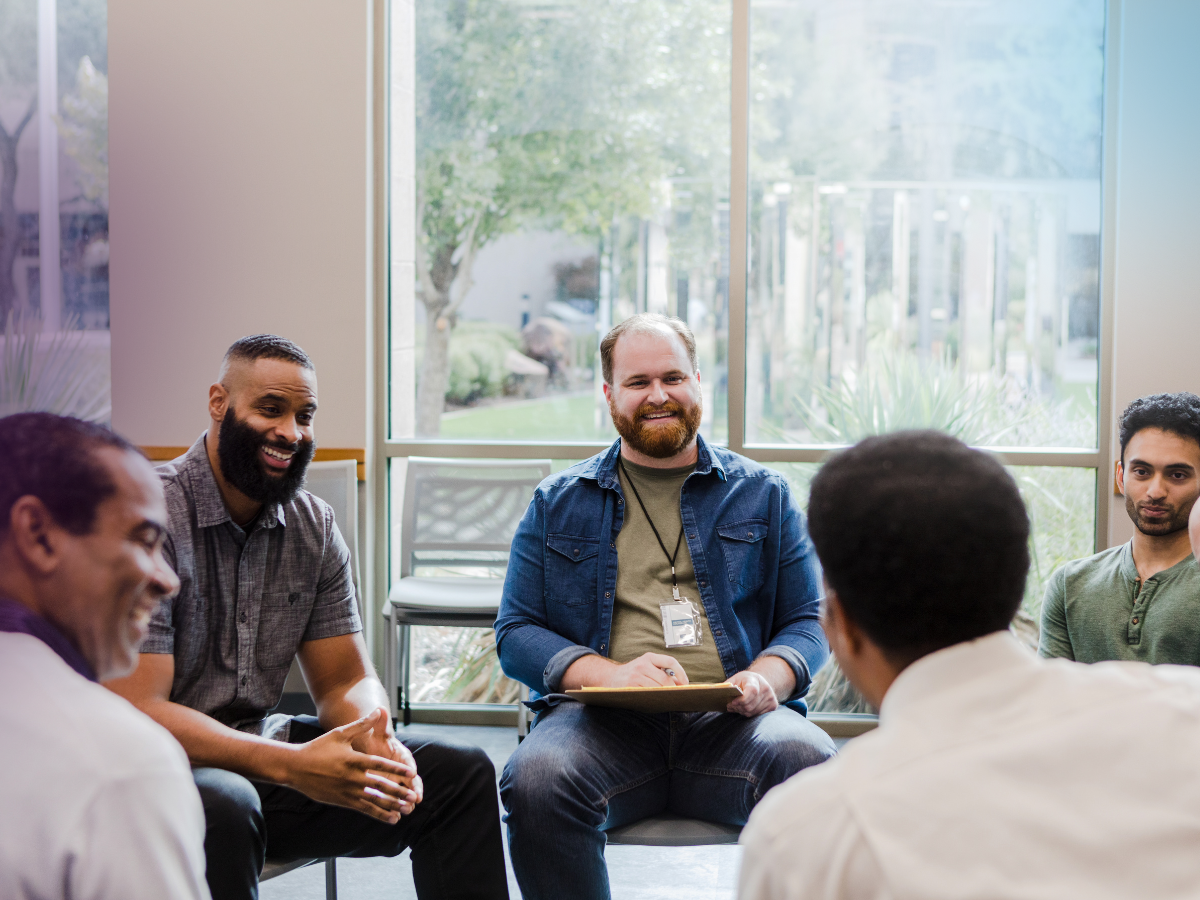

Understanding the 5 stages of grief
Grief is one of the most personal things we experience. Everyone feels and reacts to it differently. When you, or someone you know, loses a loved one, it's important to remember there’s no right or wrong way to grieve.
At a time of bereavement, reaching out for support can help. For compassionate funeral arrangements, our team is here for you.
Exceptional service
Rated 5/5 on Feefo
Experience you can trust
Over 74,000 cremations a year
Expert funeral care
Supporting families for over 30 years
The 5 stages of grief
For most people, it’s common to experience grief in stages and to feel different emotions from one day to the next. You may have heard about the five stages of grief before - a model first created in the 1960s to better understand and manage grief:
While your grief might not necessarily happen this way, or in this order, recognising the different manifestations of grief can make them easier to deal with. It can be a comfort to know that other people have gone through the same emotional changes as you.

Denial
Denial serves as the first crucial coping mechanism during the 5 stages of grief. It can manifest in a variety of ways, reflecting the diverse nature of individual experiences with grief. For some, denial may involve an outright refusal to accept the reality of the loss, while others might engage in behaviours that distract them from facing the painful truth. This stage can vary widely among individuals, influenced by their unique personalities, backgrounds, and relationship with the deceased.
At its core, denial is the brain's way of protecting itself from the immediate shock of loss. The human mind can only process so much pain at once, and denial serves as a buffer, giving the bereaved person time to come to terms with their new reality gradually. During this stage, it's not uncommon for individuals to continue talking about their lost loved one as if they were still alive, or to hold onto possessions and routines associated with them. This behaviour is a natural part of the grieving process, allowing the person to slowly adapt to the absence of their loved one.
It's important to recognise that denial is a very normal and natural emotion to experience. It provides a temporary reprieve from the overwhelming sorrow that accompanies loss, giving the bereaved a chance to gather their strength before confronting the full weight of their grief. This stage should not be rushed or judged, as it is a critical part of healing.
Comforting someone in denial involves patience and understanding. Acknowledge their feelings and allow them the space to grieve in their own way and at their own pace. Reassure them that what they are experiencing is a normal reaction to an incredibly difficult situation. With time and support, most individuals will move beyond denial, gradually allowing the reality of their loss to sink in and beginning the process of healing.
Tips for coping with denial
Coping with denial can be challenging, but there are several strategies that can help ease the process. These three tips can gently guide you towards acceptance, allowing you to process your emotions in a healthy and supportive manner.
- Journaling: Journaling provides a private space to express grief and can help you gradually acknowledge the reality of your loss.
- Talking to loved ones: Loved ones can offer support, understanding, and a sense of connection, helping you feel less alone in your grief.
- Allowing yourself time to process emotions: Allowing yourself time to process your emotions without pressure or judgement can facilitate healing and acceptance.

Anger
Anger at the deceased, or themselves, is a common emotion in the bereaved. They may feel that death is cruel and unfair and have a sense of having been abandoned by their loved one. This anger is a strong emotional response that often masks their sadness and fear for the future. The bereaved may seem difficult and unapproachable at the time when they need comfort and support the most.
Anger might be directed not just at others, but internally as well. People often blame themselves, questioning if they could have done something differently to prevent the loss. This self-directed anger can be incredibly painful, contributing to feelings of guilt and regret. Recognising that this anger is a natural part of the grieving process is essential. It is a way for individuals to express the deep pain they are feeling and can be a crucial step toward healing. By allowing themselves to feel and work through this anger, they can begin to confront and process their underlying grief.
Tips for coping with anger
Dealing with anger during the grieving process can be intense, but there are effective strategies to help manage this powerful emotion. These tips aim to channel your anger constructively, providing healthy outlets for expression and understanding.
- Engage in physical activity: Physical exercise such as running, yoga or a walk can be a great way to release built-up tension and frustration.
- Explore creative outlets: Creative outlets provide a constructive way to express and process your emotions, offering a sense of relief and accomplishment.
- Talk to loved ones or professionals: Loved ones and professionals can offer a listening ear, guidance, and tools to help you healthily navigate your anger.

Bargaining
The sense of helplessness when someone dies often triggers strong feelings of regret that things hadn’t turned out differently. ‘What if I’d done this’ or ‘If only that had happened’ are common thoughts where the bereaved person wishes they could go back and change the past. They imagine themselves bargaining with a higher power to bring their loved one back.
Bargaining is a natural response to the feelings of helplessness that accompany grief. When faced with a situation beyond our control, it's instinctive to try to regain a sense of influence or agency. Common thoughts during this stage might include making promises or deals with a higher power, such as, "If you bring them back, I’ll be a better person," or "I would give anything to have just one more day with them." These thoughts reflect the deep yearning to reverse the loss and the desperation to alter reality.
This stage can also involve a focus on "if-only" scenarios and hypotheticals, where individuals replay events over and over in their minds, imagining different outcomes. They might think, "If only I had insisted they go to the doctor sooner," or "What if I had been there with them?" These thoughts are a way of coping with the pain by temporarily creating an alternate reality where the loss didn’t occur. Although this can be a painful and exhausting process, it is a crucial part of grieving. It reflects the intense love and connection the bereaved had with their loved one, and the profound impact of their loss.
Tips for coping with bargaining
Navigating the bargaining stage of grief can be particularly challenging due to the intense feelings of regret and helplessness. However, some strategies can help you manage these emotions and find a path towards acceptance.
- Practice mindfulness: Engage in mindfulness techniques to stay grounded in the present moment, helping to reduce anxiety and the urge to dwell on "what if" scenarios.
- Explore creative outlets: Focusing on positive memories and aspects of life by writing them down in a gratitude journal can shift your perspective and foster a sense of peace.
- Seek spiritual support: If faith is important, consider seeking support from a spiritual leader or community.

Depression
When the reality of death sinks in, the overwhelming sense of sadness can lead to depression. The bereaved may feel that carrying on no longer has any purpose and that their own life is effectively over too. As depressed people can become withdrawn and difficult to reach, they can become more isolated and cut off from everyday life. Depression can last weeks or even years and may come in waves. The bereaved may appear accepting and upbeat one day and deeply sad the next.
Depression manifests differently from person to person. Some might experience a constant low mood, while others may have periods of intense sadness interspersed with moments of normalcy. It's important to recognise that these variations are normal. Seeking support from mental health professionals can be crucial in managing depression, especially if it becomes overwhelming. External support resources like Samaritans can provide immediate help and a listening ear when things feel too heavy to bear.
In addition to emotional symptoms, grief can cause physical symptoms such as fatigue, changes in appetite, and sleep disturbances. These physical manifestations can further impact one's ability to cope with loss and highlight the importance of comprehensive care. Addressing both the emotional and physical aspects of grief through a combination of professional support, self-care, and reaching out to support networks can aid in the healing process. If depression becomes too overwhelming, it is vital to seek help. Mental health professionals can provide strategies and interventions to help navigate this challenging time, and resources like the Samaritans offer support for those in crisis.
Tips for coping with depression
Coping with depression during grief can be incredibly challenging, but there are strategies that can help manage these intense emotions. Implementing these tips can provide structure and support, aiding in the healing process.
- Establish a routine: Creating a daily routine can bring a sense of normalcy and stability, helping to navigate through the days more effectively.
- Reach out to support networks: Connecting with friends, family, or support groups can provide comfort, understanding, and a sense of community during such a difficult time.
- Seek professional help: If depression becomes overwhelming, seeking help from a mental health professional is crucial.

Acceptance
Although the loss of a loved one never leaves, there slowly comes a time when the pain eases and the bereaved can start to live life again, happy in their memories and grateful for what the deceased brought to their life.
Acceptance doesn’t mean forgetting the deceased but finding a way to move forward. It involves acknowledging the reality of the loss and learning to live with it. This stage is about integrating the loss into your life and recognising that while life will never be the same, it can still hold meaning and joy. Acceptance can be seen as a way of honouring the memories of the lost loved one by cherishing the time spent together and allowing those memories to inspire and guide the future.
While these five stages of grief are common, it’s important to remember that not everybody experiences them in this order. For some, powerful feelings like anger and depression may continue to resurface from time to time. Just remember, although the expression "time is a great healer" is a bit of a cliche, it holds a strong element of truth. Acceptance often comes gradually and can coexist with other stages of grief, reflecting a deep, ongoing process of adjustment and healing. By reaching this stage, the bereaved can find peace and continue to live a fulfilling life, keeping the memory of their loved one alive in their hearts.
Tips for coping with acceptance
Reaching the stage of acceptance in the grieving process can be a significant turning point. These strategies can help you embrace this stage while continuing to honour your loved one's memory and finding ways to move forward with your life.
- Create a memory box Collect meaningful items and memories of your loved one to keep their presence close and cherish the times you shared.
- Engage in new activities: Finding new hobbies or interests can help you rediscover joy and create a sense of purpose.
- Join a support group: Sharing your experiences with others who have also experienced loss can provide comfort, understanding, and a sense of community.

Setting up a funeral plan
One of the most difficult things to consider while grieving is the logistics of organising a funeral. However, by purchasing a funeral plan for a loved one or even for yourself, you and your family can navigate through the logistical complexities with a little more calm.
A funeral plan lets you arrange and pay for a funeral in advance, whether for yourself or someone else. Planning a funeral ahead of time means you can choose the type of funeral you would like to have, your preferred funeral plan provider and the payment schedule that would best suit you.
Funeral plans can be paid for either upfront in a single payment or in monthly instalments over a set period of time. This helps relieve your loved ones of financial and planning burdens during a difficult time and ensures your funeral wishes are carried out exactly as you want.
What's included in a funeral plan
The specifics of what is included in a funeral plan can vary across different funeral providers.
Here’s a summary of what is included with Distinct Cremations:
- Essential funeral director services, including assistance with all legal and cremation paperwork
- Collection by private ambulance and preparation for cremation at our state-of-the-art mortuary facilities
- Provision of a coffin and a respectful cremation at one of our own crematoriums
- Ashes are either personally returned within 14 days or respectfully scattered at the crematorium, based on the family's preferences

Direct Cremation Plan
From £1,999
or £20.74* per month

Our Direct Cremation Plan is a great choice for those looking for a simple, low-cost unattended cremation without a funeral ceremony.
With our Direct Cremation Plan, the cremation takes place with no service or mourners present at our high-quality crematoria where dignified care is guaranteed.
** Price advertised is for a 50 year old paying over a 10 year period. Total cost is £2,374.80 and includes administration fees.
View our Direct Cremation Plan planFuneral Service Plan
From £2,499
or £28.68** per month

Our Funeral Service Plan offers an affordable funeral for those looking for simplicity and to be surrounded by their nearest and dearest.
With our Funeral Service Plan, you have the choice of a 30 or a 60 minute service. This can be family-led or led by a professional celebrant. The choice is yours.
** Price is for a 50 year old paying over a 10 year period. Total cost is £3,441.60 and includes admin fees.
View our Funeral Service PlanIs grief always a linear process?
Grief is not always a linear process; it often unfolds in a more complex and fluid manner. While the five stages of grief provide a useful framework, many people do not experience these stages in that order. It’s common for individuals to move back and forth between stages, revisiting certain emotions as they process their grief. For instance, someone might feel a sense of acceptance only to later experience a resurgence of anger or sadness.
Understanding that grief can be non-linear helps to normalise the varied and unpredictable nature of bereavement. Each person’s journey through grief is unique, influenced by their relationship with the deceased, personal coping mechanisms, and life circumstances. It’s important to remember that there is no “right” way to grieve, and it’s perfectly normal for your experience to deviate from the classic model. Embracing the non-linear nature of grief can offer comfort and reassurance, affirming that whatever you are feeling and however you are coping is part of a valid and personal healing process.
Getting support
If you're struggling or would just like someone to talk to, below are a few helplines that do great work and provide a shoulder to lean on for anyone who needs support:
Samaritans (Call: 116 123) - Free 24/7 support for anyone needing any kind of emotional support
Cruse (Call: 0808 808 1677) - Free helpline supporting those suffering with grief
Veterans UK (Call: 0808 191 4218) - Government-run support organisation providing free support for veterans and their families
Age UK (Call: 0800 678 1602) - The UK's leading charity helping millions of older people with support, companionship and advice
The Silver Line (Call: 0800 470 8090) - Free 24/7 helpline for older people struggling with loneliness, sadness or lowness

Other helpful resources
Anticipatory grief and how to manage it

Anticipatory grief is an experience many of us go through when we know a loved one is coming to the end. But there are ways to manage anticipatory grief and there is support out there.
Preparing for your own death

It's never a nice feeling thinking about your own death, but most of us have plans regarding what will happen to our estate and what will happen at our funeral.
Funeral plans for yourself or a loved one

Whether you're planning for yourself or someone else, funeral plans are worth considering as they allow you to cement the funeral arrangements at a less stressful time.
What our customers say about us
We offer the highest level of support, but don't just take our word for it. Below are recent reviews from customers who bought a funeral with us.








